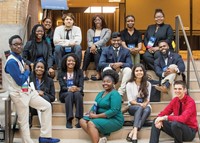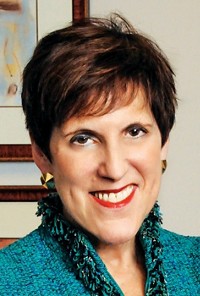Advertisement
Grab your lab coat. Let's get started
Welcome!
Welcome!
Create an account below to get 6 C&EN articles per month, receive newsletters and more - all free.
It seems this is your first time logging in online. Please enter the following information to continue.
As an ACS member you automatically get access to this site. All we need is few more details to create your reading experience.
Not you? Sign in with a different account.
Not you? Sign in with a different account.
ERROR 1
ERROR 1
ERROR 2
ERROR 2
ERROR 2
ERROR 2
ERROR 2
Password and Confirm password must match.
If you have an ACS member number, please enter it here so we can link this account to your membership. (optional)
ERROR 2
ACS values your privacy. By submitting your information, you are gaining access to C&EN and subscribing to our weekly newsletter. We use the information you provide to make your reading experience better, and we will never sell your data to third party members.
People
NOBCChE celebrates 50 years
At its annual meeting, the National Organization for the Professional Advancement of Black Chemists and Chemical Engineers highlights its past while looking ahead to future progress
by Jonathan Forney
October 9, 2023
| A version of this story appeared in
Volume 101, Issue 33

There are roughly 76,000 chemists and chemical engineers in the US. Of them, an estimated 5,000 are Black. And of those Black chemists and chemical engineers, 1,500, or about 30%, are members of the National Organization for the Professional Advancement of Black Chemists and Chemical Engineers (NOBCChE, pronounced “no-buh-shay”).
These statistics were provided by Simon Shannon, chair of NOBCChE’s Board of Directors and director of business development at 3M, to kick off the organization’s annual conference, which ran from Sept. 11 to 14.
Shannon celebrated the numbers but said the organization can do more. It wants to raise the share of Black chemists and chemical engineers who are members to 50% by 2025.
Seven Black chemists and chemical engineers founded NOBCChE in 1972 as a way to provide resources to advance themselves and their Black colleagues. While the organization’s mission is to promote the advancement of people of color in the chemical sciences, people don’t have to be Black to join.
The volunteer-run organization celebrated its 50th anniversary at the conference, held in New Orleans. The group’s first annual conference, in 1974, was also held in New Orleans.

In addition to its work with professionals and college students, who were well represented at the annual conference, NOBCChE organizes programming, such as events with regional chapters, to get K–12 students interested in science. In 2024, the organization plans to host a summit, a science fair, and a science bowl for K–12 students.
This year’s conference celebrated all that NOBCChE has accomplished in its 50 years. It also featured events and resources for up-and-coming professionals and students, moments for recognizing the achievements of NOBCChE’s members, and plenty of sharing of goals for the future.
“It’s important that people leave here with something tangible,” said Renã Robinson, NOBCChE’s president for 2022–23 and a chemistry professor at Vanderbilt University.
Throughout the week, speakers told attendees that their identities could be tools for gain as opposed to hurdles to overcome. “You bring your experiences and your perspectives to the table,” Mae Jemison, the first woman of color to go to space, said in her keynote address. “I would encourage you, every day, to use your perspective.”
This sentiment was echoed by Zakiya Wilson-Kennedy, a researcher at Louisiana State University and NOBCChE’s 2023 fellow. “Knowing who you are is not insignificant. As young scientists, I encourage you to get to know yourself,” Wilson- Kennedy said.
During the state of NOBCChE address on the first day of the conference, Wilson-Kennedy gave a presentation on her research on an intersectional approach to improving chemistry education, research, and practice.
Wilson-Kennedy’s talk emphasized acknowledging and celebrating the benefits of having a diverse student body. She also urged educators to consider a more systematic approach to understanding where their students come from, as opposed to one focused solely on their individual identities. “We also need to start to think of the systems people are moving through,” Wilson-Kennedy said.
This year’s conference set records for the organization, both in terms of fundraising and attendance. More than $1 million was raised through a combination of sponsors, grants, and exhibitors. The exhibition hall and gala both sold out. There were an estimated 1,000 more hotel rooms booked compared with the last in-person conference.
Many of the attendees were students from regional NOBCChE chapters. The organization has added 22 regional chapters since 2021. There are now 70 chapters around the country, and NOBCChE hopes to expand to additional universities and regions.
As the week went on, attendees were invited to talks on chemistry concepts, research-presentation advice, laboratory safety, chemistry education, mentoring, and more. Both undergraduate and graduate students had the chance to present research posters. The winners in each category were honored during the closing ceremonies.
Some of the programming featured well-established Black scientists offering advice to the next generation of chemists and chemical engineers. The presentations emphasized the underrepresentation of Black people in the chemical industry, the need to increase their numbers, and ways to help them have lasting careers.

“You need to be able to communicate up and down,” said Candi Hudson, a research branch chief for the US Department of the Interior’s Bureau of Safety and Environmental Enforcement. “You also need to be able to pivot, if necessary.”
There were also messages of hope to current students: their futures are not set in stone, and they alone have the power to decide what’s best for themselves.
“Don’t rush to decide [what to do],” said Victor McCrary, vice president for research at the University of the District of Columbia. “There’s always time.” McCrary is a past president of NOBCChE and currently serves on the US National Science Board.
The event also offered opportunities to earn scholarships and prizes geared toward career advancement, such as money for travel to future American Chemical Society meetings. ACS has had a memorandum of understanding with NOBCChE since 2016 that includes discount membership programs and other benefits. ACS publishes C&EN.
Two high school students were awarded $50,000 scholarships through a partnership between NOBCChE and the Society for Laboratory Automation and Screening. Shannon said NOBCChE is hoping to resurrect its endowment to be able to give more scholarships in the future.
The week was capped by an awards gala. Some of NOBCChE’s founding members congratulated the organization on its achievements in a video tribute. Awards were presented for mentorship, young scientists, outstanding teachers, and others making an impact in their communities and the chemical field.
Jemison encouraged attendees to keep pushing for big leaps and discoveries in their work. Such leaps will require interdisciplinary cooperation and compassion, she said. “It is critically important that we stay involved in the extraordinary.”
The former astronaut also highlighted the importance of access to quality education and educators’ role in protecting the next generation’s agency to decide what they want to be. She shared an anecdote about how one teacher, years ago, didn’t believe her when she said she wanted to be a scientist.
Jemison spoke to both the progress Black people have made in the sciences over the decades and how much work remains. She said it is not enough to just be in the room; Black people should be actively shaping the work and be confident in their expertise to contribute.
“As leaders, you get to set the metrics of what success is,” Jemison said. “We have a world that has remarkable potential and capacities. The world is depending on us to participate.”
The gala concluded with board members’ recognition of NOBCChE’s administrative officers. This acknowledgment also served as a baton pass to the group’s next batch of elected leaders.
The event’s planning committee took a moment to celebrate 2022–23 president Robinson, whose term ended Oct. 1, and shine a spotlight on then-president-elect Bridgette Shannon, who is a global portfolio manager at 3M.
“All is well for the future of Black chemists and engineers,” president-elect Shannon said.




Join the conversation
Contact the reporter
Submit a Letter to the Editor for publication
Engage with us on Twitter